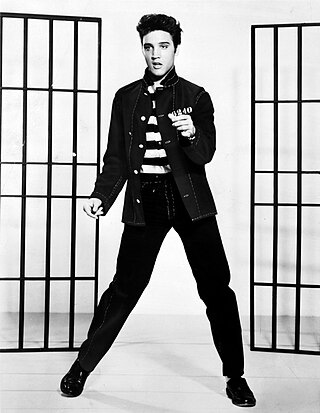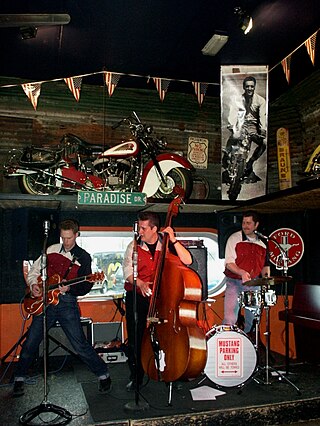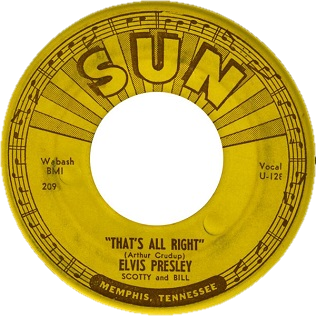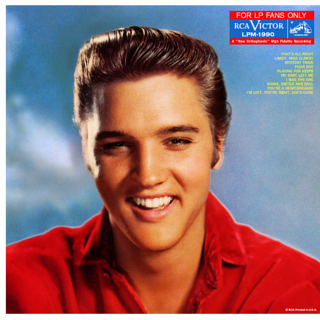Related Research Articles

Elvis Aaron Presley, also known mononymously as Elvis, was an American singer and actor. Known as the "King of Rock and Roll", he is regarded as one of the most significant cultural figures of the 20th century. Presley's energized interpretations of songs and sexually provocative performance style, combined with a singularly potent mix of influences across color lines during a transformative era in race relations, brought both great success and initial controversy.

Winfield Scott Moore III was an American guitarist who formed The Blue Moon Boys in 1954, Elvis Presley's backing band. He was studio and touring guitarist for Presley between 1954 and 1968.

Rockabilly is an early style of rock and roll music. It dates back to the early 1950s in the United States, especially the South. As a genre, it blends the sound of Western musical styles such as country with that of rhythm and blues, leading to what is considered "classic" rock and roll. The term "rockabilly" itself is a portmanteau of "rock" and "hillbilly"; the latter is a reference to country music that contributed strongly to the style. Other important influences on rockabilly include western swing, boogie-woogie, jump blues, and electric blues.

"Jailhouse Rock" is a song recorded by American singer Elvis Presley for the film of the same name. It was written by Jerry Leiber and Mike Stoller. RCA Victor released the song on a 45 rpm single on September 24, 1957, as the first single from the film's soundtrack EP. It reached the top of the charts in the U.S. and the top 10 in several other countries. The song has been recognized by the Grammy Hall of Fame, the American Film Institute, and others.

"Promised Land" is a song lyric written by Chuck Berry to the melody of "Wabash Cannonball", an American folk song. The song was first recorded in this version by Berry in 1964 for his album St. Louis to Liverpool. Released in December 1964, it was Berry's fourth single issued following his prison term for a Mann Act conviction. The record peaked at #41 in the Billboard charts on January 16, 1965.

"That's All Right" is a song written and originally performed by the American blues singer Arthur Crudup and recorded in 1946. It was rereleased in early March 1949 by RCA Victor under the title "That's All Right, Mama", which was issued as RCA's first rhythm and blues record on its new 45 rpm single format.

Elvis Presley is the debut studio album by American rock and roll singer Elvis Presley. It was released by RCA Victor, on March 23, 1956,. The recording sessions took place on January 10 and January 11 at the RCA Victor Studios in Nashville, Tennessee, and on January 30 and January 31 at the RCA Victor studios in New York. Additional material originated from sessions at Sun Studio in Memphis, Tennessee, on July 5, August 19 and September 10, 1954, and on July 11, 1955.

"Hard Headed Woman" is a rock and roll song recorded by Elvis Presley and published by Gladys Music, Presley's publishing company, in 1958. It is an American 12-bar blues written by African American songwriter Claude Demetrius. It was most notably recorded as a rock and roll song by Presley as part of the soundtrack for his 1958 motion picture King Creole, and was included on the record album of the same name. The song was also released as a single in both 78 RPM and 45 RPM formats. In 1958, it went to No. 1 on the Billboard charts and went to No. 2 for two weeks on the R&B chart. Notably, it became the first rock and roll single to earn the RIAA designation of Gold Record.

Elvis is the second studio album by American rock and roll singer Elvis Presley, released by RCA Victor on October 19, 1956 in mono. Recording sessions took place on September 1, September 2, and September 3 at Radio Recorders in Hollywood, with one track left over from the sessions for Presley's debut album at the RCA Victor recording studios on January 30 in New York. It spent four weeks at #1 on the Billboard Top Pop Albums chart that year, making Presley the first recording artist to have both albums go straight to number one in the same year. It would go on to spend 5 weeks at #1 in total. It was certified Gold on February 17, 1960, and Platinum on August 10, 2011, by the Recording Industry Association of America.

Elvis Is Back! is the fourth studio album by American singer Elvis Presley, released on April 8, 1960 by RCA Victor. It was Presley's first album of new material since 1958's King Creole soundtrack, as well as his first to be recorded and released in stereophonic sound. The album marked Presley's return to music after his discharge from the U.S. Army.

Elvis' Golden Records is a compilation album by American rock and roll singer Elvis Presley, issued by RCA Victor in March 1958. It compiled his hit singles released in 1956 and 1957, and is widely believed to be the first greatest hits album in rock and roll history. It is the first of five RCA Victor Elvis' Golden/Gold Records compilations, the first four of which were issued during Presley's lifetime. The album peaked at number three on the Billboard Top Pop Albums chart and was certified 6× platinum on August 17, 1999, by the Recording Industry Association of America.

For LP Fans Only is a compilation album by American singer and musician Elvis Presley, released on February 6, 1959 by RCA Victor. It compiled previously released material from an August 1956 recording session at 20th Century Fox Stage One, a September 1956 session at Radio Recorders in Hollywood, sessions on January 10 and 11 at the RCA Victor Studios in Nashville, two more at the RCA Victor Studios in New York, and multiple sessions at Sun Studio. The album reached number 19 on the Billboard Top Pop Albums chart.

Elvis' Gold Records Volume 4 is a greatest hits album by American rock and roll singer Elvis Presley, issued by RCA Victor in mono and stereo, LPM/LSP 3921, in January 1968, with recording sessions taking place over an eight-year span at RCA Studio B in Nashville, Tennessee, and at RCA Studios and Radio Recorders in Hollywood. It is a compilation of hit singles released between 1961 and 1967, peaking at number 33 on the Billboard 200. It was certified Gold on March 27, 1992, by the Recording Industry Association of America.

"C'mon Everybody" is a 1958 song by Eddie Cochran and Jerry Capehart, originally released as a B-side.
"Big Boss Man" is a blues song first recorded by Jimmy Reed in 1960. It became one of his most popular songs, although the songwriting is credited to Luther Dixon and Al Smith. Chicago-based Vee-Jay Records released it as a single, which became one of Reed's last appearances on the record charts. The song has been recorded by artists in diverse styles, including Elvis Presley, B.B. King, and Hope Sandoval, who also had chart successes with the song.

Elvis the King is a box set comprising 18 singles of the recorded work of American singer and musician Elvis Presley, released in 2007 by RCA Records. The box set is available in both CD and 10" vinyl formats.
"Trouble" is a blues song written by Jerry Leiber and Mike Stoller, originally performed by Elvis Presley in 1958 and covered by a number of artists in later years.

King Creole is the second soundtrack album by American singer and musician Elvis Presley, issued by RCA Victor, LPM 1884 in mono in September 1958, recorded in four days at Radio Recorders in Hollywood. It contains songs written and recorded expressly for the 1958 film of the same name starring Presley, and peaked at No. 2 on the Billboard Top Pop Albums chart. The album was previously released as an EP album with two volumes, King Creole Vol 1 and King Creole Vol 2. King Creole Vol 1 peaked at #1 for 30 weeks on the EP album charts. It followed the film's release by over ten weeks. It was certified Gold on July 15, 1999, by the Recording Industry Association of America.

"Bossa Nova Baby" is a song recorded by Elvis Presley on January 22, 1963, at Radio Recorders in Hollywood, California as part of the soundtrack of the 1963 motion picture Fun in Acapulco. It was released as a single that year reaching the Top Ten in the U.S. It was written by Jerry Leiber and Mike Stoller.

Paradise, Hawaiian Style is the thirteenth soundtrack album by American singer and musician Elvis Presley, released by RCA Victor in mono and stereo, LPM/LSP 3643, in June 1966. It is the soundtrack to the 1966 film of the same name starring Presley. Recording sessions took place at Radio Recorders in Hollywood, California, on July 26 and 27, and August 2, 1965. It peaked at number 15 on the Top LP's chart.
References
- ↑ "King Creole Soundtracks (1958)". IMDb.com. Retrieved 19 January 2016.
- ↑ "Elvis Presley Song: King Creole (1958)". Archived from the original on 21 September 2013. Retrieved 20 September 2013.
- 1 2 "king+creole | full Official Chart History | Official Charts Company". Official Charts Company. Retrieved 2016-05-04.
- ↑ "Elvis Presley - King Creole". SongMeanings. Retrieved 26 October 2013.
- ↑ "Viva Elvis: The Album". iTunes. 11 November 2010. Retrieved 26 October 2013.